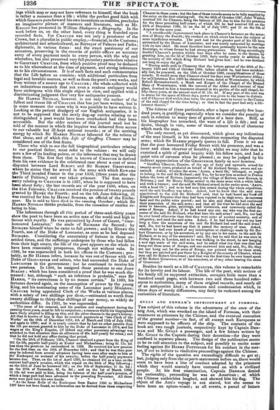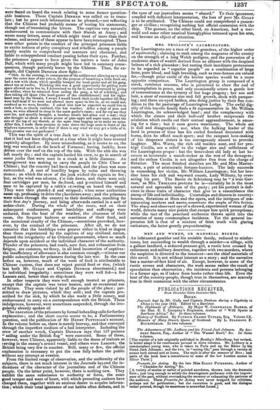GULLY AND DENHAM'S IMPRISONMENT AT FORMOSA.
THE subject of this volume is the adventures of the crew of the brig Ann, which was wrecked on the island of Formosa, with their treatment as prisoners by the Chinese, and the eventual execution of the greater number—in fact, of all except such Europeans as were supposed to be officers of the ship. The contents of the book are two rough journals, respectively kept by Captain DEN- HAM and Mr. GULLY a passenger, and a few letters written by Mr. GULLY to the Captain during their detention—for they were confined in separate places. The design of the publication seems to be to call attention to the subject, and possibly to excite some feeling against Sir HENRY POTTINGER for his conduct in the mat- ter, if not to irritate to vindictive proceedings against the Chinese. The rights of the question are exceedingly difficult to get at; but, judging only from the ex parte statements before us, there would seem to have been a line of conduct adopted by the prisoners which they would scarcely have ventured on with a civilized people. At his first examination, Captain DENErest‘ denied his nationality, pretending he was an American ; at which the Chinese authorities laughed, and showed him his flag. The object of the Ann's voyage is not stated, but she seems to have been an opium-vessel; at all events, a parcel of letters
were found on board the wreck relating to some former question- able business. These Captain Dcuusu was called on to trans- late; but he gave such information as he pleased,.—not reflecting that the Chinese had probably means of testing his statements, though not of translating the letters. The captives very naturally endeavoured to communicate with their friends at Amoy ; and wrote many letters, some of which might treat of more than their
release, and several of these appear to have been intercepted. There were other points in the conduct of the principal prisoners liable to excite notions of privy conspiracy and rebellion among a people totally unable to comprehend our manners and character, and liable to misapprehend conduct passing before their eyes. Further, the prisoners appear to have given the natives a taste of John Bull, which with many people might have led to summary conse- quences, though patiently borne by the Chinese. Thus, for ex- ample, did Captain DENHAM show fight- " 16th. In the evening, in consequence of the soldiers not allowing us to keep near the outer door of our prism, for the purpose of breathing a little fresh air, had a row with them, which speedily brought the head-gaoler and all his gang, about ten or twelve. Thiuking this was a good opportunity for getting more space allowed us to live in, I determined to try for it, and commenced by giving
the soldier, when he returned from calling the gang a bit of a licking ; and then taking old Quat (the head-gaoler of the establishment) and his right- hand man by the throats, I swore I would knock their heads together till they
were half-dead if we were not allowed more space to live in, as we could not, confined as we were' breathe. I asked him how he expected we could live in such a hole, so closely confined, this hot weather. After a deal of pros and
eons, we were allowed to sleep in the outer gaoler's room ; and for my use they sent for, and speedily brought, a bamboo trestle bed-place and a mat ; they
also brought us about a dozen pieces of pine-apple and sugar-cane, about the size of the top of my thumb, at the same time begging us to make no noise. After this, I made them promise to take down the large mats in front of the windows tomorrow, in order that if there is any wind we may get a little of it. This promise was not performed.
This was the spirit of a true Jack tar : it is only to be regretted that it had not been display ed at a time when it might have averted captivity altogether. By some misreckoning, as it seems to us, the brig was wrecked on the beach of Formosa ; having, luckily, been driven user the reef on the top of the tide. With the ebb she was left nearly dry ; and the captain landed his crew, to go in search of some junks that were seen in a creek at a little distance. An arrangement was making to carry the people to Chin Chew or Chimoi ; but the country had been roused, and the place was soon surrounded. A sort of hostility began by noise and throwing stones ; on which the crew of the junk wished the captain to fire ; but, as the wind was adverse, fie tide down, and there were only four cartridges per man, he declined, and pormitted himself and men to be captured by a rabb!e crowding on board the vessel. They were then plundcr.d and stripped ; when some authorities eame up, professing to drive the ilunderers away ; and the prisoners were taken through the country to their destination, marching for their first day's journey, and being afterwards carried in a sort of
sedan-chair. During the whole of the route, and on their
subsequent confinement, great hardships and sufferings were endured, from the heat of the weather, the closeness of their room, the frequent badness or scantiness of their food, and the occasional cruelty of the Chinese,—sometitnes provoked, how- ever, by the conduct of the prisoners. After all, we do not conceive that the hardships were greater either in kind or degree than those experienced by the captives of any civilized nation, beyond the irregularity of an Oriental government, where so much depends upon accident or the individual character of the authority. Plunder of the prisoners, bad roads, sore feet, and exhaustion from fatigue, are common, we fancy, in all land locomotion of captives: the insufficiency of allowance is also common enough,—witness our public subscriptions for prisoners during the late war. In the case
before us, however, much of the want of food is attributable to Chinese custom, that does not reject putrid food or rice, (which last both Mr. GULLY and Captain DENHAM abominated,) and to individual irregularity : sometimes they were well fed—a few Lascars said, better than on ship-board.
In other respects they were well enough treated as prisoners, except that the captain was twice beaten, and an occasional use of fetters. They were visited by all the people of the place ; per- mitted to draw pictures, which they sold • and the captain pre- scribed for the sick, by which he also made a little money, and endeavoured to carry on a correspondence with the British. These indulgences, however, were sometimes suspended, through the irre- gularity already spoken of. The execution of the prisoners by formal beheading calls forfurther explanation ; and the short course seems to be, a Parliamentary question, and the publication of Sir HENRY POTTINGER'S account. In the volume before us, there is merely hearsay, and that conveyed through the imperfect medium of a bad interpreter. Including the crew of another wreck, Captain DENHAM says that 157 persons " sailing under the British flag" were executed. Some of these, however, were Chinese, apparently liable to the doom of traitors as serving in the enemy's armed vessel, and others were Lascars; the British being very few in number. Still, many or few, the official explanation is necessary to put the case fully before the public without any attempt at evasion.
From the limited range of observation, and the uniformity of the subjects, there is not much interest in the Journals beyond the in- dications of the character of the journalists and of the Chinese people. On the latter point, however, there is nothing new. They exhibit the same submission to authority or force, the same good temper and want of heart, with which preceding authors have charged them, together with an anxious desire to acquire informa- tion; which their total ignorance of our habits often defeats, and in
the eyes of our journalists seems "absurd." To their ignorance, coupled with deficient interpretation, the loss of poor Mr. GULLY is to be attributed. The Chinese could not comprehend a passen- ger or civilian ; recognizing nothing but official connexion with the ship. The gunner, on the other hand, an American, had a mer- maid and some other nautical hieroglyphics tattooed upon his arm, and became an object of attention.























 Previous page
Previous page